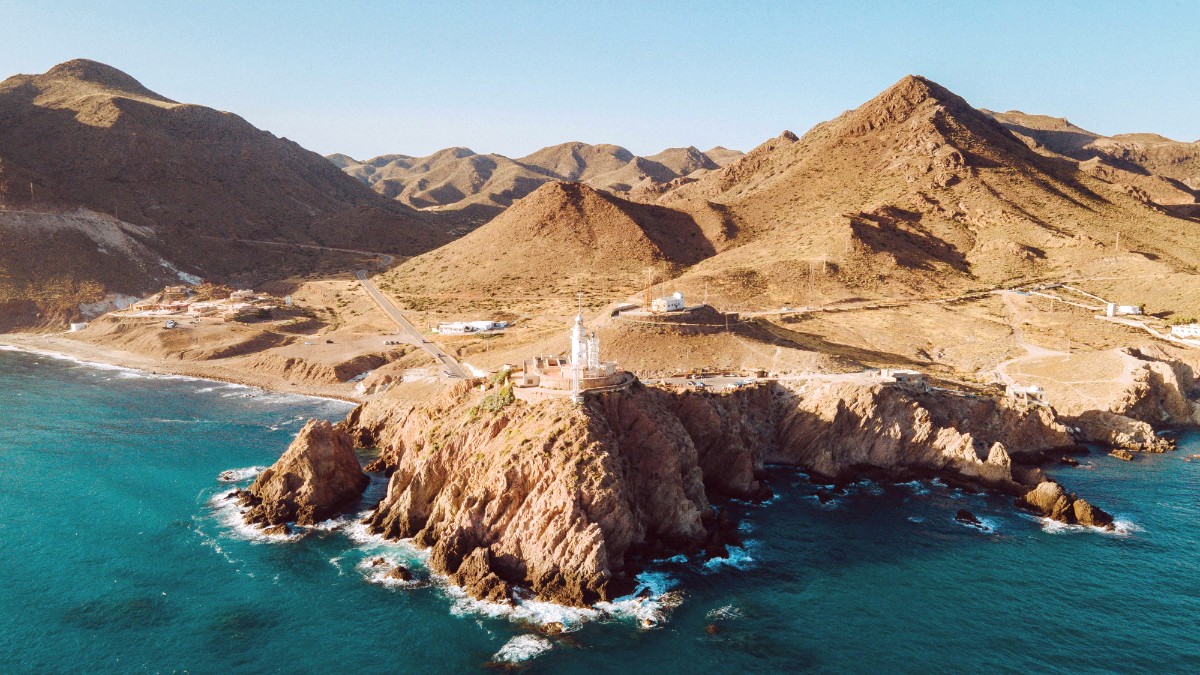
Andalucia, Spain
Almerian cuisine is deeply rooted in its fishing and agriculture traditions. The region, known as "Europe's Vegetable Garden," produces high-quality fruits and vegetables. Moorish heritage subtly flavors the food with spices and nuts, favoring rice dishes.
Proximity to the Mediterranean Sea and North Africa shapes its emphasis on fresh seafood and simple flavors. The unique "free tapa" culture in Almeria city reflects a deep-seated social custom of sharing food and drink.
Almeria is famous for its custom where many bars offer a complimentary tapa with each drink. Order a drink, and the bar presents a small, free dish. "Tapeo" involves moving from bar to bar to sample different tapas. Guests typically do not choose the complimentary tapa.
Spanish meal times are later. Lunch (Almuerzo) is the main meal, 2:00 PM to 4:00 PM; many restaurants offer a "Menu del Día." Dinner (Cena) is late, 9:00 PM onwards, sometimes as late as 11:00 PM. Breakfast (Desayuno) is lighter, 8:00 AM to 11:00 AM.
Meals are social occasions and unhurried. Service is relaxed. Bread often comes with meals and may carry a small charge, usually listed on the menu.
A traditional, hearty stew with small, spherical pasta-like "gurullos" and rabbit. Often includes chickpeas, saffron, and seasonal vegetables. A warming, flavorful dish found in traditional Almerian restaurants or inland eateries.
Found in traditional restaurants, especially inland.
Fresh fish (sea bream, sea bass, red prawns from Garrucha, squid, octopus) grilled simply or lightly fried. This cooking method highlights the superb quality and freshness of local seafood.
Widely available in coastal restaurants and tapas bars.
A popular Almerian tapa: a toasted slice of baguette with aioli or tomato, topped with ham, cheese, tuna, or anchovies. An easy-to-find, satisfying snack in almost any tapas bar.
An omnipresent tapa in Almeria city bars.
Indalicos are traditional shortbread cookies, often shaped like the Indalo man. Soplillos de la Alpujarra are light, airy, meringue-like cookies with egg whites, sugar, and almonds.
Literally "fried milk," this unique dessert presents a creamy, sweet custard that is chilled, cut into squares, battered, fried, then dusted with sugar and cinnamon. It features a surprising texture and delightful taste.
Almeria's fine dining scene has grown. These restaurants focus on innovative interpretations of traditional Andalusian and Mediterranean cuisine, often using locally sourced ingredients. Many offer tasting menus. Find these in the city center or upscale hotels.
These are plentiful throughout Almeria city and its coastal towns. They provide a wide variety of Spanish, Andalusian, and international dishes in a relaxed, comfortable setting. Here you find a good balance of quality, atmosphere, and price.
Tapas bars present the best option for budget dining in Almeria, with many offering a free tapa with each drink. For an excellent value lunch, seek out restaurants with a "Menu del Día."
Mercado Central de Almería, the main municipal market, delivers an authentic local experience, with stalls selling fresh produce, meat, fish, and cheeses. An excellent place to observe local life and purchase ingredients.
Supermarkets like Mercadona and Carrefour also carry a range of fresh produce and prepared foods.
Almeria offers diverse international cuisines due to tourism and a varied local population. Options include Italian pizzerias, Chinese restaurants, Indian eateries, and Middle Eastern choices, especially in the city center and larger towns.
Expansive choices for global tastes.
Almeria's most iconic dining concept: receive a complimentary tapa with each drink. A social ritual and economical way to sample dishes.
Relaxed beachfront dining, especially in El Zapillo or Cabo de Gata, focusing on fresh grilled seafood.
Fixed-price lunch menus (starter, main, dessert, drink) provide excellent value and a taste of local fare.
Embrace the Spanish custom of late lunch and dinner, often extending into the late evening, especially for dinner.
Awareness of "sin gluten" grows. Larger, modern restaurants generally advise on ingredients. Naturally gluten-free options include grilled meats, fish, salads (without croutons), and many vegetable preparations.
Supermarkets stock "sin gluten" products for self-catering.
Communication of needs is important. Smaller, traditional establishments may have limited understanding.
"No puedo comer lácteos" (I cannot eat dairy).
Clear communication of your needs is very important. Learning Spanish phrases (e.g., "Soy celíaco/a, sin gluten, por favor" - I am celiac, no gluten, please) is helpful.
Apps like HappyCow (vegetarian/vegan) and Gluten-Free Passport (gluten-free) deliver specific resources.
Local chefs offer cooking classes focused on traditional Andalusian or Almerian cuisine. These often feature a market visit for ingredient selection, followed by hands-on preparation.
Guided walking tours explore Almeria's unique tapas culture, local markets, and culinary history. These tours visit several traditional bars, offering insights into customs and history while sampling different tapas.
Arrangements for visits to olive oil mills in the surrounding countryside (Sierra de los Filabres or Alpujarra Almeriense) are possible. Learn about olive oil production and participate in tastings.
This is the most unique and iconic dining concept. Order a drink and receive a complimentary tapa. It is a social ritual, a way of life, and an economical method to sample many different dishes.
A uniquely Almerian social ritual.
Almeria's chiringuitos, especially in El Zapillo or within Cabo de Gata, present a distinct, relaxed beachfront dining experience focused on fresh grilled seafood.
Casual, fresh beachfront dining.
Almerian cuisine celebrates its abundant fresh produce from the "Huerta de Europa" and diverse seafood from the Mediterranean.
Venture beyond the main tourist areas to discover small, traditional eateries where authentic Almerian flavors thrive.
Aligning a visit with local food festivals presents opportunities to experience specific seasonal specialties.
When ordering tapas, clarify if a dish contains meat or fish broth if a vegetarian diet is followed. "Vegetariano" sometimes includes fish in Spain, so "sin carne y sin pescado" (without meat and without fish) is clearer for strict vegetarians.